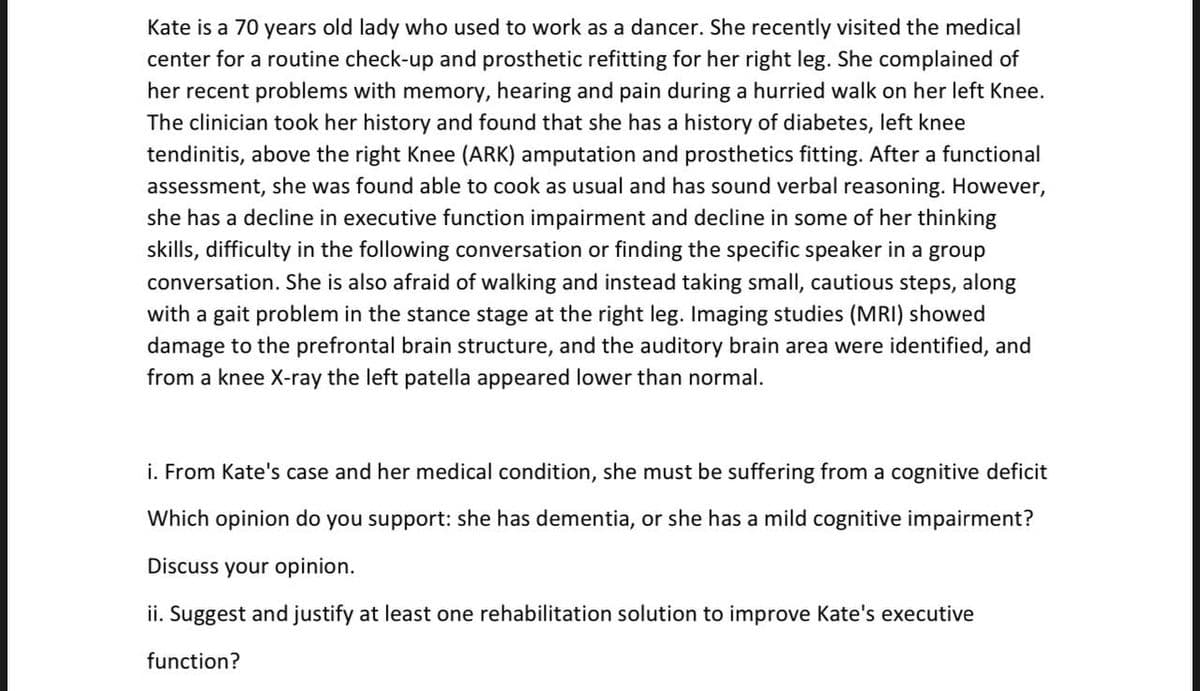Kate is a 70 years old lady who used to work as a dancer. She recently visited the medical center for a routine check-up and prosthetic refitting for her right leg. She complained of her recent problems with memory, hearing and pain during a hurried walk on her left Knee. The clinician took her history and found that she has a history of diabetes, left knee tendinitis, above the right Knee (ARK) amputation and prosthetics fitting. After a functional assessment, she was found able to cook as usual and has sound verbal reasoning. However, she has a decline in executive function impairment and decline in some of her thinking skills, difficulty in the following conversation or finding the specific speaker in a group conversation. She is also afraid of walking and instead taking small, cautious steps, along with a gait problem in the stance stage at the right leg. Imaging studies (MRI) showed damage to the prefrontal brain structure, and the auditory brain area were identified, and from a knee X-ray the left patella appeared lower than normal. i. From Kate's case and her medical condition, she must be suffering from a cognitive deficit Which opinion do you support: she has dementia, or she has a mild cognitive impairment? Discuss your opinion. ii. Suggest and justify at least one rehabilitation solution to improve Kate's executive
Kate is a 70 years old lady who used to work as a dancer. She recently visited the medical center for a routine check-up and prosthetic refitting for her right leg. She complained of her recent problems with memory, hearing and pain during a hurried walk on her left Knee. The clinician took her history and found that she has a history of diabetes, left knee tendinitis, above the right Knee (ARK) amputation and prosthetics fitting. After a functional assessment, she was found able to cook as usual and has sound verbal reasoning. However, she has a decline in executive function impairment and decline in some of her thinking skills, difficulty in the following conversation or finding the specific speaker in a group conversation. She is also afraid of walking and instead taking small, cautious steps, along with a gait problem in the stance stage at the right leg. Imaging studies (MRI) showed damage to the prefrontal brain structure, and the auditory brain area were identified, and from a knee X-ray the left patella appeared lower than normal. i. From Kate's case and her medical condition, she must be suffering from a cognitive deficit Which opinion do you support: she has dementia, or she has a mild cognitive impairment? Discuss your opinion. ii. Suggest and justify at least one rehabilitation solution to improve Kate's executive
Chapter10: Special Senses
Section: Chapter Questions
Problem 5CS
Related questions
Question

Transcribed Image Text:Kate is a 70 years old lady who used to work as a dancer. She recently visited the medical
center for a routine check-up and prosthetic refitting for her right leg. She complained of
her recent problems with memory, hearing and pain during a hurried walk on her left knee.
The clinician took her history and found that she has a history of diabetes, left knee
tendinitis, above the right Knee (ARK) amputation and prosthetics fitting. After a functional
assessment, she was found able to cook as usual and has sound verbal reasoning. However,
she has a decline in executive function impairment and decline in some of her thinking
skills, difficulty in the following conversation or finding the specific speaker in a group
conversation. She is also afraid of walking and instead taking small, cautious steps, along
with a gait problem in the stance stage at the right leg. Imaging studies (MRI) showed
damage to the prefrontal brain structure, and the auditory brain area were identified, and
from a knee X-ray the left patella appeared lower than normal.
i. From Kate's case and her medical condition, she must be suffering from a cognitive deficit
Which opinion do you support: she has dementia, or she has a mild cognitive impairment?
Discuss your opinion.
ii. Suggest and justify at least one rehabilitation solution to improve Kate's executive
function?
Expert Solution
This question has been solved!
Explore an expertly crafted, step-by-step solution for a thorough understanding of key concepts.
Step by step
Solved in 2 steps

Recommended textbooks for you


Understanding Health Insurance: A Guide to Billin…
Health & Nutrition
ISBN:
9781337679480
Author:
GREEN
Publisher:
Cengage

Fundamentals of Sectional Anatomy: An Imaging App…
Biology
ISBN:
9781133960867
Author:
Denise L. Lazo
Publisher:
Cengage Learning


Understanding Health Insurance: A Guide to Billin…
Health & Nutrition
ISBN:
9781337679480
Author:
GREEN
Publisher:
Cengage

Fundamentals of Sectional Anatomy: An Imaging App…
Biology
ISBN:
9781133960867
Author:
Denise L. Lazo
Publisher:
Cengage Learning

Medical Terminology for Health Professions, Spira…
Health & Nutrition
ISBN:
9781305634350
Author:
Ann Ehrlich, Carol L. Schroeder, Laura Ehrlich, Katrina A. Schroeder
Publisher:
Cengage Learning